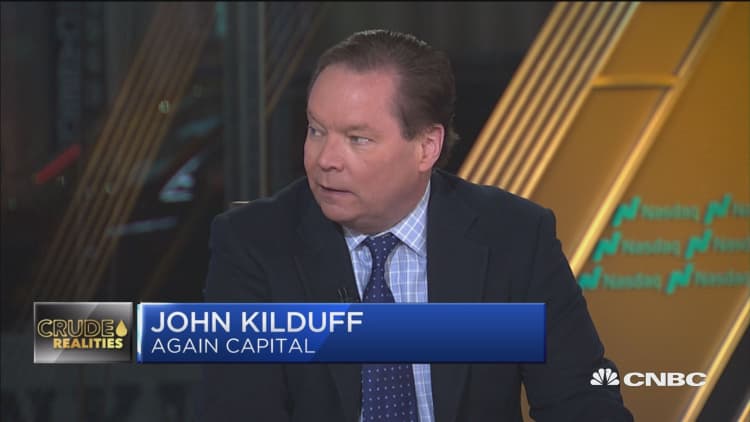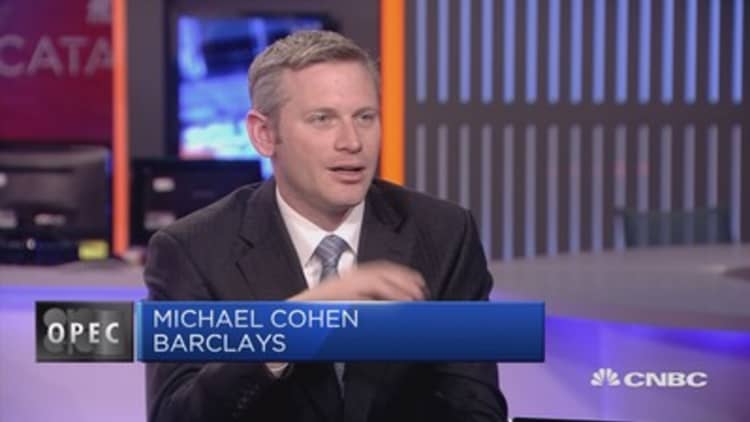Oil prices pared gains in a volatile trade on Tuesday as fears flared that demand would stall due to a trade war between the U.S. and China, and as Russia remained a stumbling block to a deal to cut global crude supply.
U.S. President Donald Trump made clear he would revert to tariffs on China if the two sides could not resolve their differences.
The comments put a damper on market enthusiasm that drove oil about 4 percent higher on Monday after Trump and Chinese counterpart Xi Jinping agreed at a meeting of the Group of 20 industrialized nations to pause an escalating trade dispute.
In Monday's session, expectations of a production cut by the OPEC and its allies, when they meet on Thursday and Friday in Vienna, had also supported prices.
OPEC and its allies are working towards a deal to reduce oil output by at least 1.3 million barrels per day, four sources said on Tuesday, adding that Russia's resistance to a significant production cut was so far the main stumbling block.

"Now we're starting to get uncertainty on both the trade and production cut fronts and the market is giving back those gains," said Gene McGillian, director of market research at Tradition Energy in Stamford, Connecticut. "Some of the optimism surrounding the easing of trade tensions seems to be evaporating."
International Brent crude oil futures rose 39 cents to $62.08 on Tuesday, after earlier touching a session high of $63.58. U.S. West Texas Intermediate (WTI) crude futures ended the session 30 cents higher at $53.25, after gaining as much as 3 percent at $54.55.
Ahead of the OPEC meeting, Saudi Oil Minister Khalid Al-Falih said it was too soon to be certain that OPEC and other oil exporters would cut production because the terms of a deal remain unresolved.
Falih said he thought the market was oversupplied but he cautioned that all members of OPEC and its allies needed to come together for a cut to go ahead.
"A cut in OPEC and Russia production of 1.3 million bpd will be required to reverse the ongoing counter-seasonally large increase in inventories," Goldman Sachs said in a note.
It added that it expected a joint effort by OPEC and Russia to withhold supply to push Brent oil prices "above the mid-$60 per barrel level."
Helping OPEC in its efforts to rein in emerging oversupply was an order on Sunday by the Canadian province of Alberta for producers to scale back output by 325,000 bpd until excess crude in storage is reduced.

OPEC's biggest problem is surging production in the United States, where output - mostly from its shale fields - has grown by about 2 million bpd within a year to more than 11.5 million bpd.
Barclays bank said in a note to clients that oil production in Texas alone "reached 4.69 million bpd in September, compared with Iraqi output of 4.66 million by our estimates." Iraq is OPEC's second-biggest oil producer behind Saudi Arabia.
Iranian President Hassan Rouhani made an apparent threat on Tuesday to disrupt other countries' oil shipments through the Gulf if Washington presses ahead with efforts to halt Iranian oil exports.
The United States has imposed sanctions on Iran and U.S. officials say they aim to reduce Iran's oil exports to zero in a bid to curb the Islamic Republic's missile program and regional influence.
"If one day they want to prevent the export of Iran's oil, then no oil will be exported from the Persian Gulf," Rouhani said.

